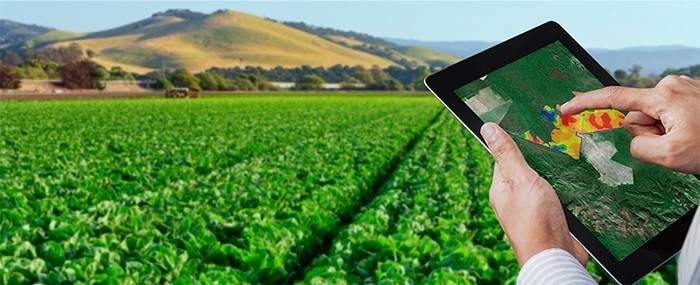
Artificial intelligence for soil fertility control
24 de abril de 2018By Suzel Tunes | FAPESP Research for Innovation – The expansion of digitization in agriculture is the purpose of InCeres, a startup based in Piracicaba, São Paulo State, Brazil, that uses artificial intelligence to predict soil fertility by means of nutrient input and output modeling.
“The starting point is a database that feeds the software for the agriculturist. The algorithm calculates all the inputs and outputs. It’s similar to a bank account,” says agronomist Leonardo Afonso Angeli Menegatti, principal investigator for a research project supported by FAPESP and the Brazilian Innovation Agency (FINEP) via the PIPE/PAPPE Grant Program.
The soil produces nutrients needed by plants, primarily calcium, magnesium, phosphorus and potassium. Different crops absorb different amounts of nutrients from the soil. Soil productivity also depends on the frequency of rainfall, which washes some of the nutrients away. “This loss can be greater or smaller depending on soil type,” Menegatti explains.
If nutrients are removed from the soil by harvesting or are dispersed by rain, they have to be replenished by applying fertilizer. It is up to the agronomist to recommend inputs for use by the farmer in the amounts needed to recoup losses. “The recommendation process is similar to a visit to the physician. After diagnosis, the agronomist prescribes inputs,” he says.
In traditional agriculture, this diagnosis is usually based on chemical analysis of the soil. However, each farm may have different needs according to location, and chemical analysis drives up production costs. Soil analysis is typically done every two years and costs some R$40 (now about US$11.30) per hectare.
Menegatti says the software solution being developed by his firm could cut costs drastically: “The farmer will be able to do without soil analysis for up to ten years. The conventional method would cost R$200 per hectare in a ten-year period, or R$40 every two years, whereas the new approach would cost a total of R$40 for the entire period, saving 80%.”
The application under development by InCeres will analyze soil fertility on the basis of data for nutrient input and output obtained from soil analysis, weather conditions, crop type and satellite images. “Satellite images let you see where plants are growing less or more. Rates of growth affect nutrient extraction,” Menegatti says.
The software will process all these data to produce precise predictions of soil fertility in different parts of a farm. “Preliminary results show correlations in the range of 77%, but our goal is 95%,” he adds.
Digital revolution
The app being developed by InCeres is an example of digital agriculture, an evolution of precision agriculture, which came to Brazil in the early 1990s. Menegatti was one of its local pioneers.
Based on management of data collected in the field, precision agriculture made strides thanks to satellite navigation systems and georeferenced imaging, which enabled agronomists to produce productivity maps.
In master’s research conducted between 2000 and 2002 at the University of São Paulo’s Luiz de Queiroz College of Agriculture (ESALQ-USP) in Piracicaba, with a scholarship from FAPESP, Menegatti designed protocols for the analysis and interpretation of soil variability data. Next, he established an agronomy consultancy called Apagri to apply his knowledge of precision agriculture in the market. As yet, he had scant technological resources. “It was hard,” he recalls. “I’m an agronomist and lacked information to resolve technical issues.”
The main technical issues were slow map processing and report generation, databases without information security, and loss of information. “Worse still, cloud computing hadn’t been invented yet. All software had to be running on your computer. Now, you can do everything on a smartphone,” he says.
From 2007 to 2013, “solving one problem after another” with the help of professionals in the field of technology, Menegatti developed new crop management solutions. It was in this context that InCeres was born, in pursuit of faster and more accurate data analysis.
By the end of 2014, InCeres was established as a software development firm for agricultural management, offering technological solutions for application in precision agriculture. Incubated at ESALQTec, InCeres is part of a group of firms working out of the Piracicaba valley region called AgTech Valley, a Brazilian agricultural technology innovation hub.
Since then, the firm has expanded into the wider field of digital agriculture, of which precision agriculture is only a part, deploying technologies that permit the creation of computer simulations based on the analysis of data stored in the cloud.
More than managing information for agronomists to meet everyday needs, the technology under development will predict how the soil will behave in the future. In Menegatti’s opinion, it has the potential to revolutionize Brazilian agriculture.
Today, agriculture is the least digitized sector of the economy, with only 20% of agricultural enterprises using computational resources. “I want to accelerate the technology adoption curve by cutting the cost of digitization in agriculture,” he says.
As the frequency of sample collection for soil analysis decreases and its cost therefore falls significantly, Menegatti believes it will be possible to surmount any resistance. “Agriculturists tend to resist change. They don’t like taking risks. But risk is linked to cost. You reduce risk by cutting costs,” he says.
In less than three years, InCeres has built a customer portfolio of some 60 agricultural firms and 1,000 farmers all over Brazil. Currently, it is pursuing international expansion by participating in competitions for startups.
In August 2017, it took part in the Agro Innovation Lab in Germany, ranking among the top 15 out of 350 agricultural startups in the world. In September, it entered the regional lap of the Startup World Cup held in São Paulo and finished as one of 11 finalists.
Company: InCeres
Site: inceres.com.br
Address: Rua Luiz de Queiroz, 1290, Piracicaba, São Paulo State, Brazil
Contact: inceres.com.br/contato/
